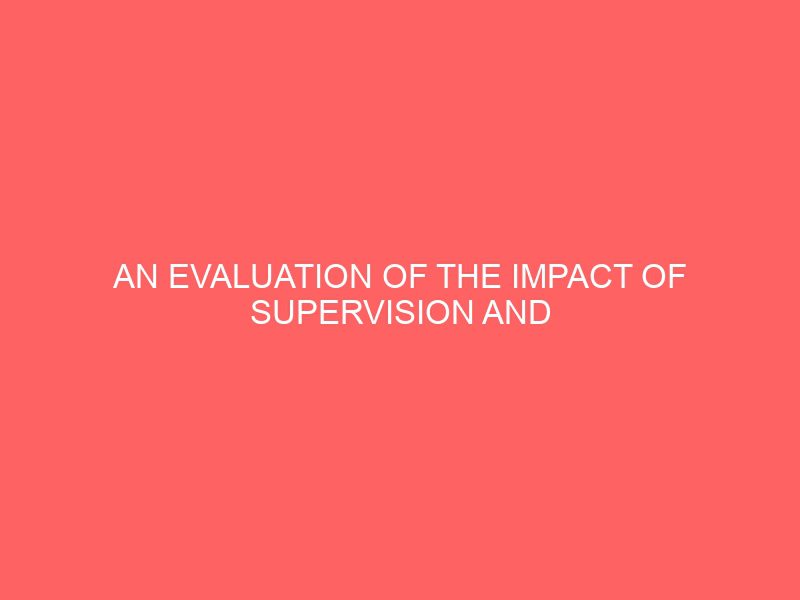AN EVALUATION OF THE IMPACT OF SUPERVISION AND CONTROL OF THE CENTRAL BANK ON THE PERFORMANCE OF COMMERCIAL BANKS
ABSTRACT
This research project tends to evaluate the impact of supervision and control of the Central Bank on the performance of commercial banks. Access Bank Nig Plc Lagos Branch was used as the case study. To aid this research both primary and secondary data were collected. The instruments used to collect data are questionnaires and oral interviews. The respondents comprised of male and female from the bank and the population put together is 150 and sample size is 109. The research design used for this work is the survey research method. In the course of this research the researcher found out that supervisory and control functions when conducted on a timely and unbiased manner ensures capital adequacy, high standard of conduct, moderation of bank charges and profitability. The researcher recommends that bank inspections should continue to be regular and timely enough; control measures of the CBN should not be too stringent as to have long negative impact on banking operations. Finally only competent, skilled and unbiased bank examiners should be engaged in bank supervision
CHAPTER ONE
INTRODUCTION
1.1 BACKGROUND OF THE STUDY
The roles of commercial banks play in the process of economic development in every country are crucial. They through financial inter mediation increase the levels of national savings and investments by mobilising idle funds from surplus spending units savers and channel them to deficit spending unitsborrowers for investments in the economy . UGBAJA 1999
By playing these roles within a particular country, the independence of global economics created the need for global inter banking, a trend which in turn emphasizes the need for the stability of the banks involved in intercontinental banking transactions.
Also, banking business carries a lot of risks and banking public needs assurance about the safety of their confidence in the banking institutions.
The need for supervision and control of commercial banks activities is to ensure that they adhere to the stipulated monetary policies, rules and regulations as well as accepted ethical conducts. However the major contributing factor that has led to the failure of Nigerian banks in the past can be described as moral hazard adverse incentives.
Moral hazards or adverse incentives are a concept with relevance to a variety of principal agent relationships characterized by asymmetric information. The moral hazard concerns the adverse incentives on banks chief executives to act in ways which are contrary to the interests of the banks creditors mainly depositors or the government if it explicitly or implicitly insures deposits by undertaking risky investment strategies such as lending at high interests rates to high risk borrowers which, if successful, would jeopardise the solvency of the bank. Bank owners have incentives to undertake such strategies because with limited liability, they bear only a portion of the downside risk but stand to gain through higher profits, a large share of the upside risk. In contrast, the depositors or the deposit insurers gain little from the upside risk but bear most of the downside risk.
1.2 STATEMENT OF THE PROBLEM
The supervision and control of commercial banks by CBN sometimes impact adversely on the operations and performance of the former. This is as a result of difficulties associated with the supervision and control mechanism.
With respect to supervision, it appears that the CBN apparatus are not effective. Banks examination are often not timely, not regularly carried out or haphazardly done.
1.3 OBJECTIVES OF THE STUDY
In lieu of the problems stated above, the objectives of the study are
1. To analyse the objectives of supervision and control of commercial banks in view of the existing monetary policies of the CBN.
2. To examine the effectiveness of the supervisory and control techniques of the CBN specifically the ability detects malpractice on time.
3. To assess the impact of supervision and control on the performance of commercial banks with regards to liquidity.
4. To appraise the ongoing reforms of the CBN.
1.4 RESEARCH QUESTIONS
The following questions will be addressed in this study
1. To what extent do the relationship between the current monetary policies of the CBN and the performance of commercials banks as it affects granting loans/credit
2. To what extent do the supervisory and control techniques effectives enough to detect misconduct on time
3. How can these functions of the CBN have any effect on the liquidity of commercial banks
1.5 SIGNIFICANCE OF THE STUDY
The significance of the study derives its usefulness from many respects. Firstly, the monetary authorities CBN and federal government will find the study very useful. This is because the study will examine the various techniques of supervision and control of commercial banks and identify their deficiencies and constraints. This information will then enable the government and the CBN to take remedial measures which will be suggested in this study.
1.6 SCOPE OF THE STUDY
The study focuses on the importance of the CBN supervision and control on the performance of the commercial banks. Thus, its scope covers the need for supervision and control as well as goals, techniques and effects of these exercises on commercial banks operations and performances
Original price was: ₦3,200.00.₦3,000.00Current price is: ₦3,000.00.








Reviews
There are no reviews yet.